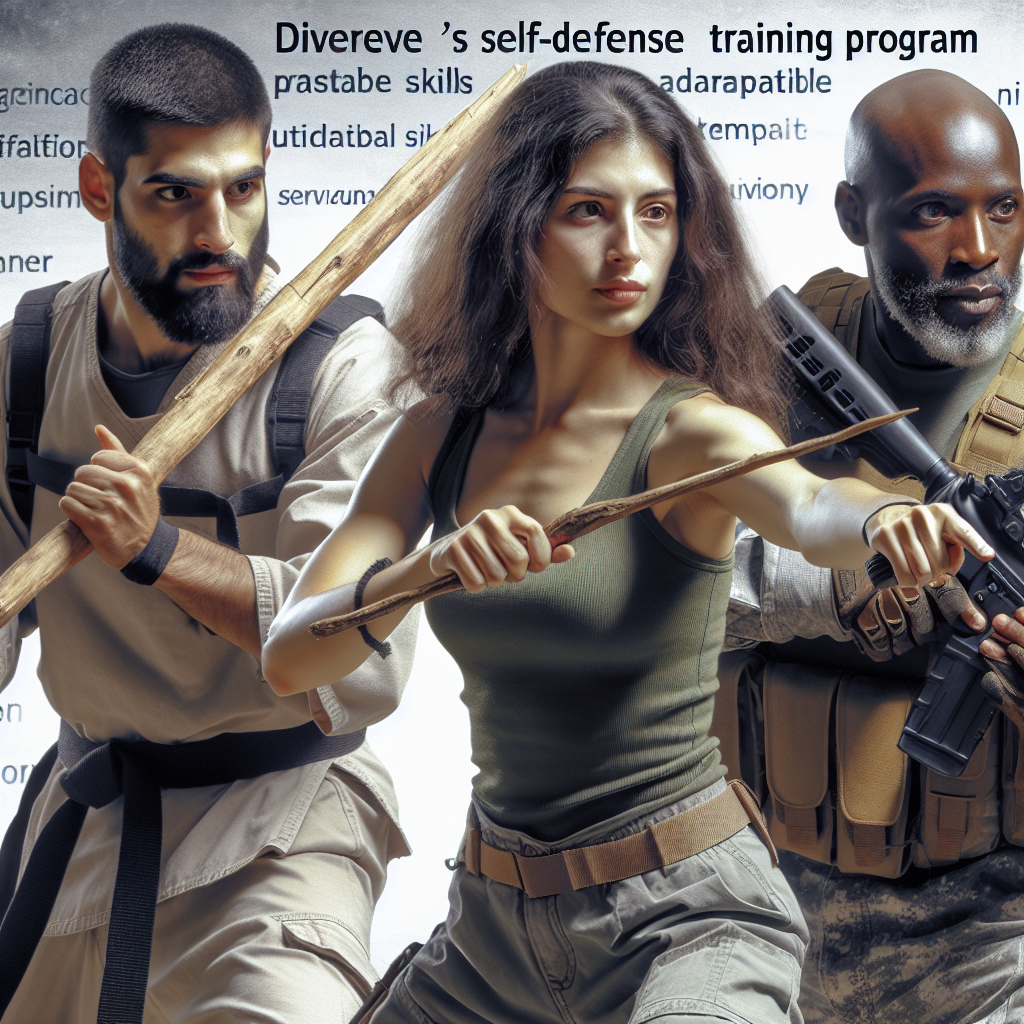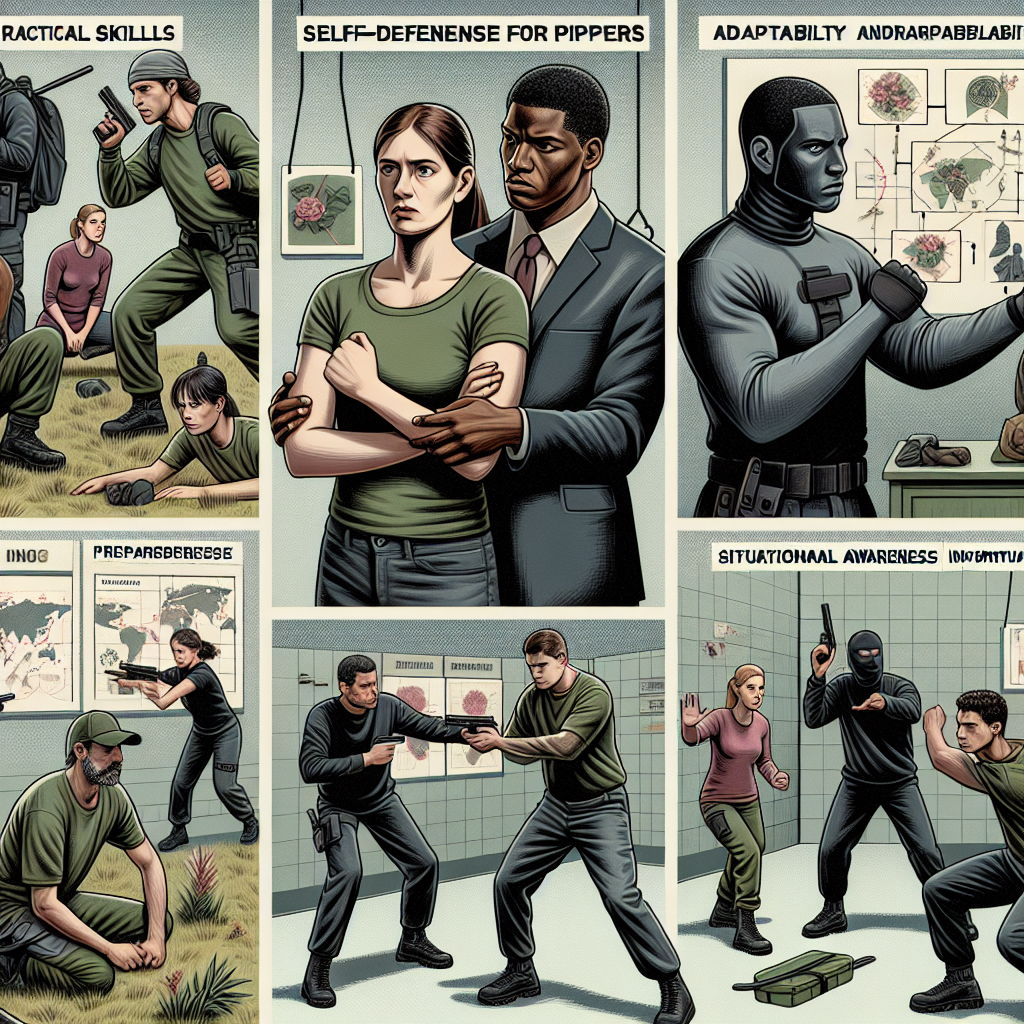When it comes to being prepared for any situation, preppers understand the importance of self-defense skills. However, with so many self-defense training programs available, it can be overwhelming to find the right one. That’s why in this article, we will explore the key factors that preppers should consider when searching for a self-defense training program. From practical techniques to realistic scenarios, we will discuss the crucial elements that will not only enhance your self-defense abilities but also provide you with the confidence you need to face any challenge that may come your way. So, let’s dive in and discover what preppers should look for in a self-defense training program.
Physical Fitness
Strength and Endurance
When choosing a self-defense training program, it is important to consider the focus on building strength and endurance. A strong and fit body is essential for effectively protecting yourself in dangerous situations. Look for a program that includes exercises and workouts specifically designed to target these areas. Whether it’s through resistance training, bodyweight exercises, or cardio workouts, the program should provide a comprehensive approach to improving your overall physical fitness.
Flexibility and Mobility
Alongside strength and endurance, flexibility and mobility are crucial aspects of physical fitness that preppers should prioritize. The ability to move freely and quickly can often make a significant difference in a self-defense situation. Look for a training program that incorporates stretching exercises, mobility drills, and techniques to improve your flexibility. This will help you in executing defensive maneuvers and techniques effectively, as well as in preventing injuries during combat.
Cardiovascular Health
Maintaining cardiovascular health is vital for preppers as it directly affects your ability to sustain physical effort during high-stress situations. Look for a self-defense training program that includes cardio exercises such as running, biking, or interval training. These activities will improve your endurance, enhance your stamina, and ensure that you can effectively respond during prolonged confrontations. Good cardiovascular health also promotes overall well-being and reduces the risk of cardiovascular diseases.
Realistic Scenarios
Practical Techniques
An effective self-defense training program should focus on teaching practical techniques that can be applied in real-life situations. Look for a program that goes beyond basic moves and incorporates training scenarios that simulate real-world encounters. This could include practicing situational awareness, learning effective strikes and blocks, and understanding how to create distance and escape from dangerous situations. The training should empower you to respond intelligently and confidently to various potential threats.
Simulated Situations
In addition to practical techniques, it is essential to seek a self-defense training program that incorporates simulated situations. By practicing in scenarios that mimic real-life confrontations, you can develop the necessary reflexes and instincts to assess and react to different threats effectively. Look for programs that offer controlled simulations, where you can learn and refine your skills in a safe yet realistic environment. This will greatly enhance your ability to handle unexpected situations and make split-second decisions.
Multiple Attackers
Preppers should also consider a self-defense training program that covers the specific challenge of facing multiple attackers. Real-life situations rarely involve just one assailant, so it is crucial to understand how to defend yourself against multiple opponents effectively. Look for a program that teaches techniques like situational awareness, footwork, and strategic positioning, enabling you to defend against multiple attackers simultaneously. The training should develop your ability to assess threats from different angles and prioritize your actions accordingly to maximize your chances of survival.

Combat Skills
Striking Techniques
Striking techniques are fundamental in any self-defense training program. Look for a program that not only teaches basic strikes like punches and kicks but also emphasizes proper technique, accuracy, and power. The training should provide a comprehensive curriculum that covers a variety of strikes, including elbows, knees, and open-hand strikes, enabling you to defend yourself effectively in a range of situations. Techniques for delivering strikes from different positions and distances should also be included.
Grappling and Ground Fighting
Another critical aspect of self-defense is grappling and ground fighting. This skill set is essential for situations where physical contact cannot be avoided or when an attacker tries to take the fight to the ground. A comprehensive self-defense training program should include techniques for escaping holds, controlling opponents, and submissions. Look for a program that covers a variety of grappling techniques, including clinching, takedowns, joint locks, and chokeholds, providing you with a well-rounded skill set for close-quarters combat.
Weapon Handling and Defense
While the focus of a self-defense training program is primarily unarmed combat, it is important to also consider the inclusion of weapon handling and defense techniques. In situations where an attacker may be armed, having the knowledge and skills to defend yourself against various weapons becomes crucial. Look for a program that offers training in weapon disarms, defense against knife attacks, and basic weapon manipulation. Learning how to effectively use common improvised weapons, such as everyday objects, can also prove invaluable in self-defense scenarios.
Mental Preparedness
Awareness and Situational Analysis
Self-defense is not solely about physical skills—it also requires mental preparedness. A good training program should prioritize the development of your situational awareness and the ability to analyze potential threats. Look for a program that includes exercises and drills to enhance your observation skills and teach you how to assess your surroundings effectively. By learning to identify potential dangers early on, you can take proactive measures to avoid or de-escalate confrontations before they escalate into physical altercations.
Decision Making Under Pressure
High-stress situations demand quick decision-making abilities. Look for a self-defense training program that provides scenarios and drills that simulate high-pressure environments, forcing you to make split-second decisions. By repeatedly practicing decision-making skills under stress, you can develop the ability to think critically and act confidently in potentially life-threatening situations. This mental preparedness is crucial for avoiding panic and making effective choices that prioritize your safety.
Emotional and Psychological Control
Maintaining emotional and psychological control is essential in self-defense situations. Look for a program that provides strategies and techniques to manage fear, stress, and adrenaline. Training should include tactics for calming your mind, controlling your breathing, and focusing your thoughts amidst chaos. By developing emotional and psychological control, you can better assess and respond to threats while maintaining a clear mind and making rational decisions.

Self-Defense Laws and Ethics
Understanding Legal Boundaries
An important aspect of self-defense training is understanding the legal boundaries surrounding the use of force. Look for a program that covers the laws and regulations regarding self-defense in your jurisdiction. Understanding what constitutes lawful self-defense, including the principles of proportionality and imminence, is crucial to ensure you stay within legal boundaries and avoid unnecessary legal repercussions. Knowledge of your rights and responsibilities as a defender is essential for making informed decisions during confrontations.
Use of Force
In line with understanding legal boundaries, a self-defense training program should also emphasize the concept of proportional use of force. It is important to recognize that self-defense should only involve the necessary level of force to neutralize a threat. Look for a program that teaches you how to assess the level of force required in a given situation, from verbal de-escalation techniques to physical self-defense measures. Understanding the appropriate use of force is critical for protecting yourself while minimizing potential harm to both yourself and the assailant.
De-escalation Techniques
Conflict resolution and de-escalation techniques are valuable skills that should be included in any self-defense training program. Being able to defuse tense situations or verbally persuade an aggressor to back down can often be more effective and safer than engaging in physical combat. Look for a program that teaches you how to communicate assertively, recognize signs of escalating aggression, and use verbal techniques to calm potentially dangerous situations. The ability to resolve conflicts peacefully can be a powerful tool in self-defense.
Qualified Instructors
Experience and Credentials
When selecting a self-defense training program, it is crucial to consider the experience and credentials of the instructors. Look for programs that have instructors with extensive backgrounds in self-defense, including certifications from recognized organizations. Instructors with real-world experience, such as military or law enforcement backgrounds, bring valuable insight and expertise to their teaching. Evaluating their qualifications will help ensure that you receive quality instruction from knowledgeable professionals.
Teaching Style and Philosophy
Finding a self-defense training program that aligns with your learning style and philosophy is important for a positive and effective learning experience. Look for programs that offer trial classes or opportunities to observe lessons to evaluate the teaching style. Some programs may focus on discipline and traditional martial arts, while others may have a more practical and modern approach. Consider what teaching methods resonate with you and will motivate you to continue training over the long term.
Student Feedback and Reviews
Another helpful aspect when choosing a self-defense training program is to seek out student feedback and reviews. Look for testimonials or reviews on the program’s website or online platforms. Positive feedback from previous or current students can provide valuable insight into the quality of the instruction, the effectiveness of the training techniques, and the overall satisfaction of the participants. Hearing about others’ experiences can help you make an informed decision about which program is the best fit for you.
Training Frequency and Intensity
Regular and Consistent Practice
Consistency is key when it comes to self-defense training. Look for a program that emphasizes regular and consistent practice to build and maintain your skills effectively. Whether it’s attending classes multiple times a week or setting aside dedicated training sessions, a program that promotes regular training will help you develop muscle memory, improve reflexes, and retain the knowledge and techniques learned. Consistency in training is vital to ensure that your self-defense skills are sharp and readily available when needed.
Challenging and Progressive Workouts
To continuously improve your self-defense skills, it is important to seek a training program that offers challenging and progressive workouts. Look for programs that provide a structured curriculum, gradually increasing the difficulty level over time. This approach ensures that you are constantly pushed out of your comfort zone, increasing your abilities and preparing you for different scenarios. Challenging workouts also enhance your physical fitness, allowing you to develop strength, endurance, and mental resilience.
Variety of Training Methods
Diversifying your training methods is crucial for a well-rounded self-defense skill set. Look for a program that incorporates a variety of training methods, such as partner drills, bag work, sparring, and role-playing exercises. This diversity keeps training sessions engaging, develops different aspects of your abilities, and prepares you to adapt to various real-life situations. A program that offers a mix of training methods ensures that you receive comprehensive and practical training that prepares you for a range of self-defense scenarios.
Fit for Prepper Lifestyle
Adaptability to Different Environments
A self-defense training program that is fit for the prepper lifestyle should prioritize adaptability to different environments. Look for a program that offers training in various settings, including both indoor and outdoor scenarios. Training in different environments enhances your ability to react and adapt to potential threats in unfamiliar surroundings. Whether it’s practicing self-defense techniques in confined spaces or training outdoors in natural terrain, a program that prepares you for diverse environments is essential for preppers.
Functional and Practical Training
Preppers should prioritize a self-defense training program that focuses on functional and practical training. Look for a program that emphasizes techniques and strategies that are applicable in real-life situations, rather than those that are only effective in controlled environments or within specific martial arts systems. Functional training means learning techniques that account for the reality of a self-defense situation, such as the use of gross motor skills, simple yet effective strikes, and efficient movement patterns.
Survival and Preparedness Mindset
A self-defense training program that is compatible with the prepper lifestyle should also instill a survival and preparedness mindset. Look for a program that emphasizes the importance of situational awareness, emergency planning, and personal safety considerations. The training should encourage you to think proactively about potential threats and develop strategies for mitigating risks. A survival and preparedness mindset goes beyond physical skills and equips you with the mental readiness necessary to navigate challenging scenarios.
Community and Support
Networking with Like-Minded Individuals
Being part of a community can greatly enhance your self-defense training experience and provide valuable support. Look for a program that promotes networking and interaction with like-minded individuals. Training alongside others who have similar goals and interests not only creates a sense of camaraderie but also allows for the exchange of knowledge, experiences, and techniques. Building a network of peers who share your passion for self-defense can provide ongoing motivation, accountability, and support throughout your training journey.
Access to Additional Resources
A self-defense training program can be enhanced by access to additional resources beyond the regular classes. Look for programs that provide supplementary materials like instructional videos, training manuals, or online resources. These resources can serve as valuable references to reinforce what you have learned during classes and continue your learning outside of the training environment. Access to additional resources allows you to review techniques, learn new skills, and deepen your understanding of self-defense principles.
Ongoing Training and Support
Preppers should seek a self-defense training program that offers ongoing training and support. Look for programs that provide opportunities for continuing education, such as advanced classes or workshops. Ongoing training ensures that your skills are continuously honed and updated to match evolving threats and scenarios. Additionally, finding a program that offers support beyond the training sessions, such as mentorship or consultation, can be instrumental in further developing your self-defense capabilities and maintaining a strong commitment to your training.
Cost and Accessibility
Affordability and Value for Money
When considering a self-defense training program, it is important to assess the cost and value for money. Look for programs that offer a transparent pricing structure and consider the cost in relation to the quality and expertise of the instruction. While cost should not be the sole determining factor, it is important to find a program that fits within your budget and provides a good return on investment. Consider the overall value of the program, including the knowledge gained, skills acquired, and support received.
Location and Availability
The accessibility of a self-defense training program is crucial for preppers. Look for programs that are conveniently located near your home, workplace, or frequently visited areas. This ensures that attending classes is convenient and minimizes barriers to regular training. Additionally, consider the program’s class schedule and availability. Find a program that offers various class times and flexible training options, allowing you to fit training sessions into your busy lifestyle without compromising consistency.
Flexible Training Options
Flexibility is an important factor when choosing a self-defense training program. Look for programs that offer flexibility in terms of training options. This could include the option to attend both group classes and private lessons, allowing you to tailor your training experience to your specific needs and preferences. Some programs may also offer online training resources or virtual classes, providing additional flexibility for those with schedule constraints or limited access to physical training facilities. Consider the available options and choose a program that can accommodate your unique circumstances and training preferences.
In conclusion, finding the right self-defense training program for preppers involves considering several key factors. Prioritizing physical fitness, realistic scenarios, combat skills, mental preparedness, self-defense laws and ethics, qualified instructors, training frequency and intensity, fit for prepper lifestyle, community and support, as well as cost and accessibility, will ensure a comprehensive and effective learning experience. By selecting a program that aligns with your needs, goals, and values, you can develop the necessary skills and mindset to protect yourself and thrive in challenging situations. Remember, self-defense is not just about physical techniques, but also about mental resilience, situational awareness, and a commitment to ongoing training and personal growth.
